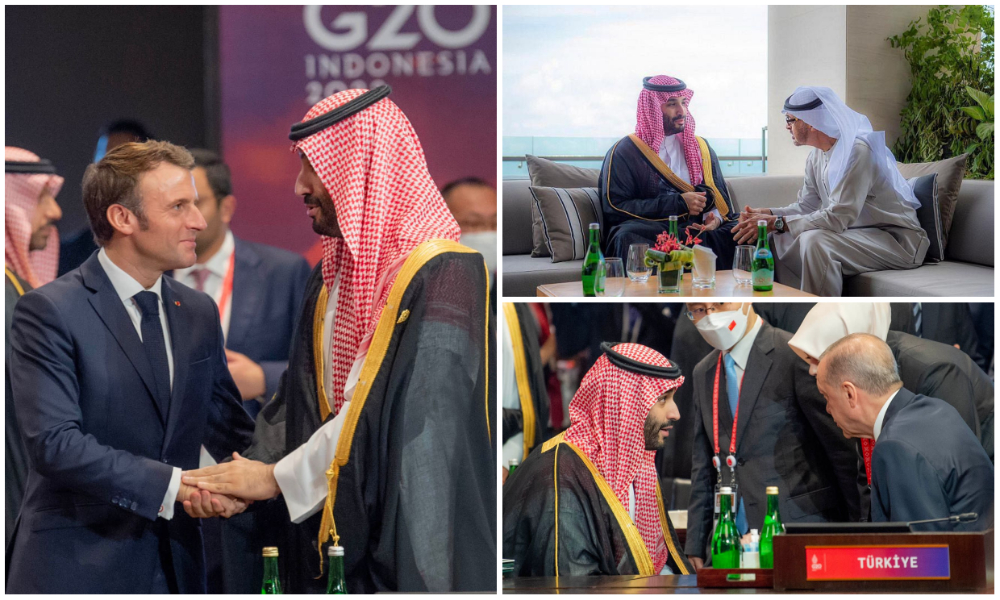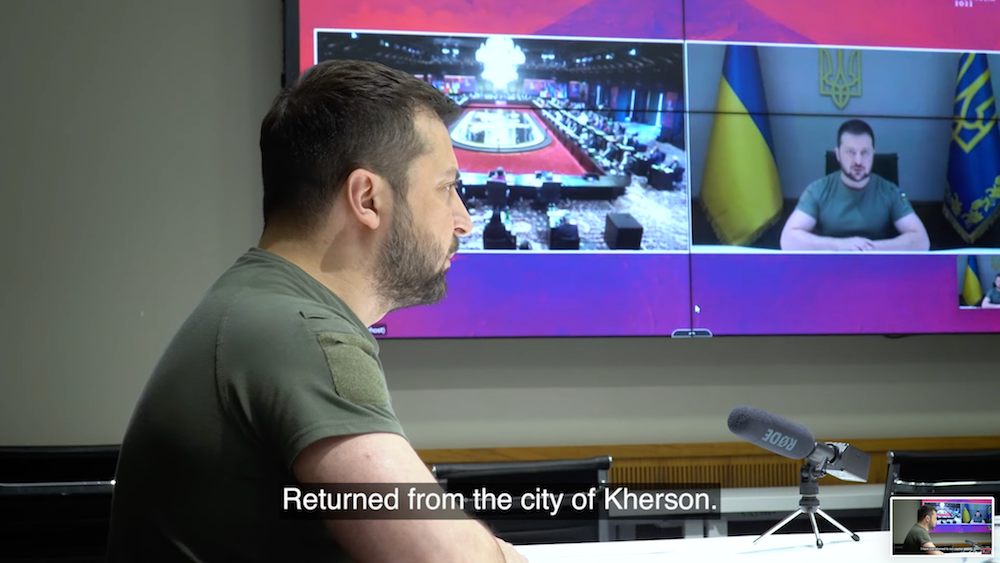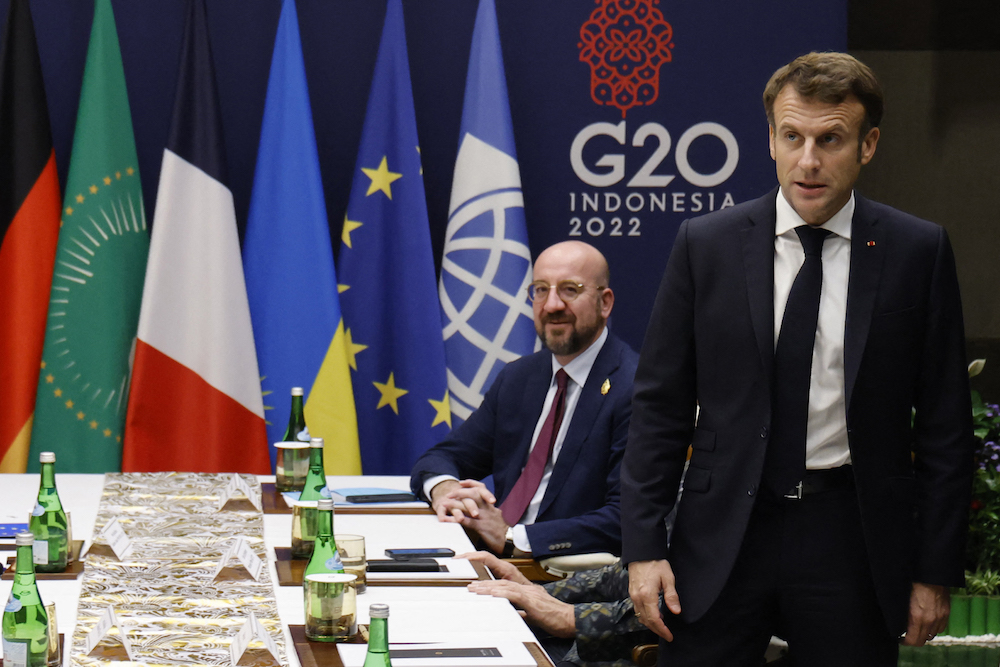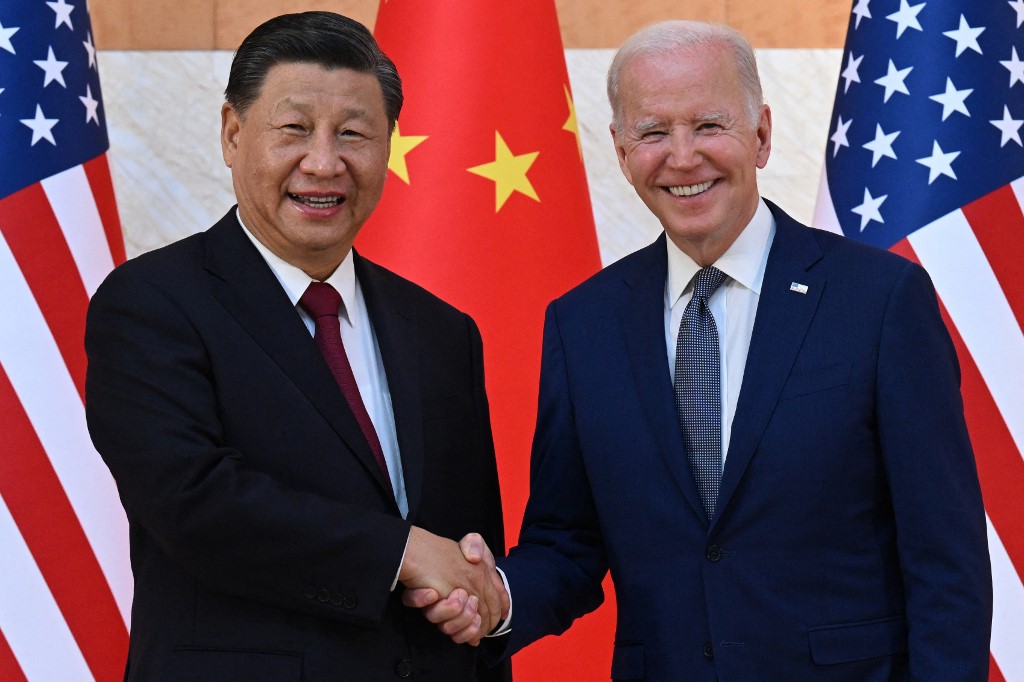DENPASAR, Bali: Russia’s invasion of Ukraine earlier this year appeared to overshadow all else on the agenda of the leaders’ meeting of the Group of 20 on Tuesday, with the conflict in Europe having fueled geopolitical tensions and a global surge in food and energy prices.
Leaders of G20 member states, invited countries and international organizations have gathered in Bali to discuss the pressing challenges facing the global economy, which is creeping toward a recession.
Indonesia, the world’s fourth-most populous country and Southeast Asia’s largest economy, is hosting the summit under the theme “Recover together, recover stronger” in the wake of the coronavirus pandemic and its economic consequences.
Although the summit’s official focus is on financial stability, health, sustainable energy, and digital transformation, host Indonesia faces another layer of complexity as it tries to bridge rifts within the G20 over the war in Ukraine.
Joko Widodo, the Indonesian president, acknowledged the mood during his opening remarks on Tuesday, just before the closed-door discussions began.

“I understand we need huge efforts to be able to sit together in this room,” he said, while calling for collaboration among countries.
He pointed out that the world could not afford to fall into “another Cold War,” adding that nations must work to “end the war.”
He said: “Today, the eyes of the world are on our meeting. Will we score success? Or will we add one more to the list of failures? For us, G20 must succeed and cannot fail.”
Seventeen G20 leaders are attending this week’s summit, including US President Joe Biden, Chinese President Xi Jinping, and Saudi Crown Prince Mohammed bin Salman.
Indonesia invited other nations and international organizations to take part, adding to a long list of world leaders that includes UAE President Mohammed bin Zayed Al-Nahyan and Singaporean Prime Minister Lee Hsien Loong.

Crown Prince Mohammed bin Salman meets French President Emmanuel Macron (right), as well as speaking with UAE President Mohammed bin Zayed (top left) and Turkish President Recep Tayyip Erdoga on the sidelines of the G20 summit. (SPA)
Volodymyr Zelensky, the president of Ukraine, addressed G20 leaders via video link on the summit’s first day, in which he shared his optimism that the conflict’s end could be in sight.
He said: “I am convinced now is the time when the Russian destructive war must and can be stopped.”
Analysts expect the war to feature prominently in the summit’s final communique, despite calls by the Indonesian hosts for dialogue and collaboration to resolve global economic problems such as inflation, and food and energy security.
Gatherings of G20 ministers since Indonesia took over the group’s presidency last December have failed to produce joint declarations. There have been disagreements between Russia and other members on the precise language, including how to describe what is occurring in Ukraine.
Dr. Ahmad Rizky Mardhatillah Umar, an Indonesian international relations researcher at the University of Queensland, in Australia said the expected final declaration on Wednesday was unlikely to fully address the global challenges facing the world today.
He told Arab News: “Given the tensions between the US and China for example in some political matters and then war in Ukraine, it is difficult to see the G20 Summit will deliver an agreeable result that can solve the global challenges facing the world today, because global challenges facing the world today are largely a political problem.

Volodymyr Zelensky, the president of Ukraine, addressed G20 leaders via video link on the summit’s first day. (Screenshot)
“So, it is a difficult task for Indonesia to deliver a joint communique which is able to solve all the global challenges.”
He noted that the challenges facing the world today were “something that goes beyond Indonesia’s reach.”
Umar added that this was “because the global crisis today requires political solutions, and it is difficult for Indonesia to mediate, for example, between Russia and Ukraine.”
The gathering in Bali follows concerted efforts by Indonesia to broker peace between the warring nations. In late June, Widodo was the first Asian leader to travel to Kyiv and Moscow to meet his Ukrainian and Russian counterparts in an effort to ease the conflict’s impact on the international community.
Bhima Yudhistira, director of the Center of Economic and Law Studies in the Indonesian capital Jakarta, also felt that the global situation was beyond Indonesia’s control.
“The summit has been overshadowed by the Ukraine war, and it’s possible that they won’t reach a final communique, even though the key of the meeting’s success is on this communique,” he told Arab News.
“Indonesia’s position is as a developing country, and the defining players are the ones in conflict and developed countries, so even being able to facilitate the meeting between America’s Joe Biden and China’s Xi Jinping at the G20 is already an achievement for now,” Yudhistira said.

Analysts expect the war to feature prominently in the summit’s final communique, despite calls by the Indonesian hosts for dialogue and collaboration to resolve global economic problems such as inflation, and food and energy security. (AFP)
On Tuesday, Biden and Xi held their first in-person meeting since the US president took office. It came amid strained relations between their two countries that span various issues, ranging from trade to the status of Taiwan.
Yudhistira was nevertheless confident that this year’s G20 Summit would go down in history.
“I think this is a historic G20. It’s historic because of the polarization, because of the crack in multilateralism, but it’s still the one forum that brings together differences, such as between the US and China,” he added.
For others, there was still hope that the summit could bring about stability.
Diana Dewi, chairwoman of the Indonesian Chamber of Commerce and Industry’s chapter in Jakarta, told Arab News: “There is hope that this would result in world peace, because with this summit it’s not only about reaching for economic growth, but ever since the beginning, like President Widodo has said, this is an event that is supposed to unite.”
News agencies reported on Tuesday that leaders of the world’s largest economies appeared ready to convey a strong message condemning Russia’s invasion of Ukraine, though the draft declaration would still need to be approved by all the group’s members.
Established in 1999 in the wake of the Asian financial crisis, the G20 was originally intended to foster global economic cooperation. But it has since morphed into a forum addressing urgent world problems. This year’s focus was on health infrastructure and food security.
The annual leaders’ summit also serves as an opportunity for informal diplomatic exchanges, as heads of state participate in bilateral talks on the sidelines of the big meeting.

Joe Biden (right) and Chinese president Xi Jinping held their first in-person meeting since the US president took office. (AFP)
Tuesday witnessed a handful of the bilateral exchanges, including that of Xi and Anthony Albanese, Australia’s new prime minister, which marked the first formal meeting between the leaders of the two countries since 2016.
The Saudi crown prince also held a number of meetings on the summit’s sidelines, including with the UAE president, British Prime Minister Rishi Sunak, and Turkish President Recep Tayyip Erdogan.
Though most international headlines have focused on US and Chinese participation in the summit due to their global economic standing, Saudi Arabia’s role “is very significant,” senior Indonesian journalist Andreas Ismar told Arab News.
“Saudi Arabia needs to diversify its economy to be less oil-reliant and they have plenty of chances of doing that in this forum,” Ismar said, alluding to the Vision 2030 reform plan aimed at diversifying the Kingdom’s economy away from hydrocarbons.
Saudi Aramco and Indonesia’s state-owned Pertamina recently agreed to work together on the possibility of developing a clean ammonia and hydrogen value chain, as both Riyadh and Jakarta prioritize efforts on transitioning toward renewable energy sources.
“I’m guessing there will be plenty more to come between Saudi Arabia and Indonesia. Cooperation between the two countries was previously more on political and culture, but it is now rapidly shifting into economics,” Ismar added.






















